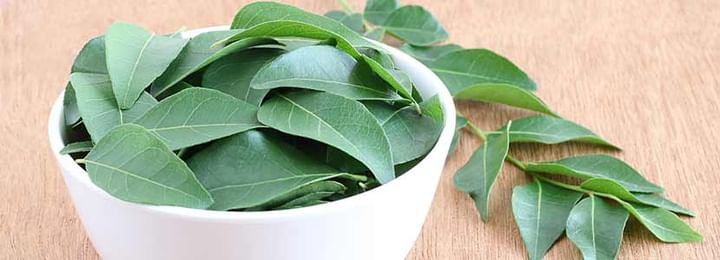Curry Leaves Benefits And Its Side Effects
Last Updated: Sep 03, 2020
Diverse utilization of antibiotics in today’s world is one of the crucial causes for the surging emergence of multi drug resistant pathogenic strains that do not respond to the usual line of treatment.
Curry leaves being popular for their various antioxidant properties and the ability to control diarrhea and several gastrointestinal problems satisfy the current trend to look out for an alternative such as herbal medicines. Barring this they have cancer fighting traits.
Curry Leaves
Curry Leaves known as Kadhi Patta is a vital herb that belongs to the Rutaceae family and is native to India and the Southeast Asian region. In spite of having a feebly acidic and slightly pungent taste, dried curry leaves are widely used in Asian cuisines for flavoring foods.
But there is more to the humble curry leaves than simply flavor. Right from helping your heart to function in a better way to enlivening your hair and skin with vitality, it is loaded with health benefits.
Nutritional Value of Curry Leaves
These high-speed growing deciduous shrubs are an obligatory part of Indian cooking where all the dishes start and end with it for seasoning or garnishing. Curry leaves are very rich in essential nutrients like copper, minerals, calcium, phosphorous, fiber, carbohydrates, magnesium and iron.
Furthermore Curry leaves also contains numerous types of vitamins and amino acids. The leaves can be dried or fried, depending on the intended use, and the fresh form is also very popular.
Nutritional facts Per 0.5 g
Vitamins and Minerals in Curry Leaves
Health Benefits of Curry Leaves
Curry Leaves Helps in Lowers Cholesterol Level
Did you know that curry leaves have properties that can help in lowering one’s blood cholesterol levels? Well, as per a published study these shrubs, packed with antioxidants prevent the oxidation of cholesterol that forms LDL cholesterol (bad cholesterol). This in turn increases the amount of good cholesterol (HDL) and protects you from heart disease and atherosclerosis.
Curry Leaves Boosts Digestion
Since days of yore, one of the benefits of curry leaves is that it aids digestion. In Ayurveda, it is believed that kadi patta has mild laxative properties that help the stomach get rid of unwanted waste.
Curry Leaves Benefits for Liver
Research on curry leaf has indicated that the tannins and carbazole alkaloids present in the leaves exhibited good hepato-protective properties. Also, its highly effective anti-oxidative property when combined with vitamin A and vitamin C not only protects, but also stimulates the organ to work more efficiently.
Curry Leaves Hastens hair growth
Curry Leaves Improve Eye Health
Curry leaves are rich in Vitamin A which contains carotenoids thus it lessens the risk of cornea damage. Vitamin A deficiency can cause disorders of the eye including night blindness, loss of vision and cloud formation. The leaves thus keep the retina healthy and defend against vision loss.
Curry Leaves Eradicates Bacteria
Every second illness is caused by infections or involves oxidative cell damage. In today’s world where incidences by antibiotic-resistant strains are growing rapidly alternative remedies to infections is a necessity. This is where curry leaves show promise.
Curry leaves are laden with carbazole alkaloids, compounds that contain antioxidant, antibacterial and anti-inflammatory properties. The compound linolool, responsible for the flowery scent of these shrubs, is also capable of killing bacteria and cell-damaging free radicals .
Curry Leaves Promotes Weight Loss
Curry leaf is a successful herb when it comes to losing weight.It is one of the best remedies to get rid of assembled fat in your body. Studies show that curry leaves can help reduce triglyceride and cholesterol level that help in tackling obesity.
Curry Leaves Keeps Anemia at Bay
Consumption of curry leaves can be helpful to people who are anemic as these leaves are a great source of iron. Presence of folic acid helps the body in absorbing iron. Without sufficient folic acid in the body, the iron is excreted from the body without being absorbed properly. Curry leaves help in this matter by providing the required amount of iron and folic acid to the body.
Controls side effects
Consumption of curry leaves reduces the effects of chemotherapy and radiotherapy and also offers protection against chromosomal damage and safeguards bone marrow.
Curry Leaves Improves Blood Circulation
Anti Diabetic Properties of Curry Leaves
One of the biggest health benefits of curry leaves is that it has the ability to control diabetes. Insulin producing pancreatic cells can be triggered and protected by including curry leaves in ones diet.
Uses of Curry Leaves
Other than a strong distinctive smell and pungent flavor, curry leaves are a rich source of vitamin A, vitamin B, vitamin C, vitamin B2, calcium and iron. Adding curry leaves to ones meals aids in the treatment of dysentery, diarrhea, diabetes, morning sickness and nausea. Curry leaves also help flush out toxins and body’s fat content.
Curry Leaves Side-Effects & Allergies
Curry leaves should be avoided if one is allergic to it. A trained medical practitioner should be consulted prior to usage by pregnant, breastfeeding women and toddlers.
Cultivation of Curry Leaves
Curry leaf plants are native to India, Sri Lanka, Bangladesh and the Andaman Islands. Though they are widely cultivated, the herbs are particularly associated with Indian cuisines. Presently, curry leaves are also cultivated in Australia, the Pacific Islands and Africa as food flavouring.
References
- Handral HK, Pandith A, Shruthi SD. A review on Murraya koenigii: multipotential medicinal plant. Asian Journal of Pharmaceutical and Clinical Research. 2012;5(4):5-14. [Cited 24 June 2019]. Available from:
- Ajay S, Rahul S, Sumit G, Paras M, Mishra A, Gaurav A. Comprehensive review: Murraya koenigii Linn. Asian J Pharm Life Sci. 2011;2231:4423. [Cited 24 June 2019]. Available from:
- Bhandari PR. Curry leaf (Murraya koenigii) or cure leaf: review of its curative properties. Journal of medical nutrition and nutraceuticals. 2012 Jul 1;1(2):92. [Cited 24 June 2019]. Available from:
Table of content
Ask a free question
Get FREE multiple opinions from Doctors



